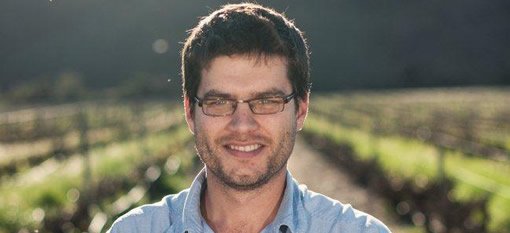Although the predictability of a wine grape harvest will never prove the safest bet, it can safely be said that the 2013 harvest will be later than usual, characterised by good quality grapes for winemakers to work with and yields which should please grape farmers.
According to Gert Engelbrecht (top photo), viticulturist of uniWines Vineyards in Rawsonville, Breedekloof, it was already apparent during the latter stages of spring last year that grapes would ripen later than usual.
“With temperatures currently rising in the Breedekloof region, one is reminded of the nice cold winter of 2012,” says Gert. “Heavy snowfall on the mountains allowed the vineyards to rest in near freezing temperatures and for a change high rainfall ensured that the soils remained cool and wet. Subsequently the cycle of the vineyard was slowed down after the vines had awakened, with bud break and flowering following slightly later than usual. As temperatures rose in December and early January berries were developing as usual, but veraison was behind schedule.”
Thus far summer has been relatively cool in the Breedekloof, with no sustained periods of intense heat despite a few hot days during mid-December. “One or two days with temperatures of over 35°C do not present a problem, but one has to be cautious when the heat persists for days on end. Thus grape farmers’ main priority at present is to apply meticulous irrigation control to ensure that the vine does enter a state of stress, yet at the same time limit vigorous growth which can impede on fruit quality.”
uniWines Vineyards produce wine from grapes originating from 2000ha grown by the member-shareholders of the company. Grape cultivars include Chenin Blanc, Colombard, Sauvignon Blanc, Chardonnay, Pinot Grigio, Cabernet Sauvignon, Pinotage, Shiraz and Merlot, with a division of 70% white and 30% red grapes.
Wines are marketed under the flag of uniWines Vineyards’ own brands, which include Meander and Ankerman, as well as the Fairtrade-certified Palesa wines. The majority of the company’s wine, however, is sold in commercial quantities to various clients locally and abroad.
According to Gert vineyard management is tailored to ensure a good balance between quality and volume. “In order to generate value for farmers, volumes are an obvious requisite, therefore it is imperative that yields are sustainable for all parties concerned,” he says. “Yet at the same time quality – of grapes and wine – is non-negotiable in the modern-day era. Therefore it is the responsibility of myself and the producers to ensure that the very best quality grapes possible reach
the cellar.”
In addition to irrigation control, the farmers are currently following a pesticide program to prevent fungal disease, but the vineyards seem perfectly healthy at the moment. “The Breedekloof has its challenges when it comes to disease control, but following the right spraying programmes has given us the desired results,” according to Gert. “Canopy management forms a critical part of our viticultural practice, ensuring the vines receive the right amount of sunshine to ensure good ripening and quality.”
Gert is especially excited about the quality of Sauvignon Blanc which is becoming noticeable in the region. As usual, certain blocks of this cultivar have been designated for separate vineyard management and preparation in the cellar in order to assert the development of these wines. “The cooler areas of Breedekloof, for example Louwshoek, have excellent weathered granite soils and we are sure the wines from this region are going to deliver a few surprises,” Gert says.
From now on, weather conditions will play a major role, with a heat-wave or two expected which can create a number of challenges in harvest-time.
“As mentioned, we expect that the early cultivars such as Chenin Blanc, Chardonnay and Sauvignon Blanc will be harvested slightly later, but if the weather becomes warmer the later cultivars could probably ripen to schedule, which will make for an extremely busy cellar,” he says. “Ultimately though, that is the way it goes when you work with a product like wine which is entirely dependent on nature, you never know what is waiting around the corner.”




